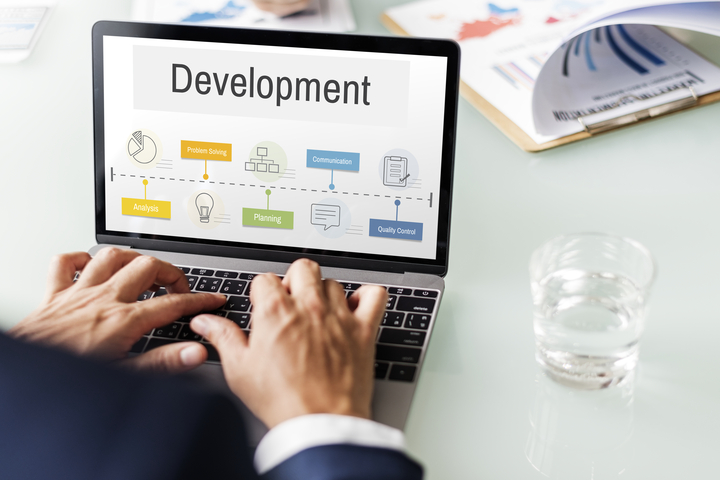Creating a decentralized autonomous organization (DAO) empowered by artificial intelligence (AI) is no longer a futuristic concept—it’s an emerging framework revolutionizing how digital agents operate autonomously on the blockchain. In this detailed guide, we’ll explore the key components, architecture, tools, and processes of AI Agent DAO on blockchain development, driving both automation and decentralization into real-world applications.
What is an AI Agent DAO?
An AI Agent DAO is a decentralized, blockchain-based organization governed by AI agents. These agents autonomously make decisions, execute transactions, and interact with other smart contracts or DAOs without human interference. The integration of AI allows these agents to learn, adapt, and evolve over time, enhancing the DAO’s decision-making capabilities.
Core Components of an AI Agent DAO
1. Blockchain Infrastructure
The blockchain serves as the trustless, immutable foundation of the DAO. Popular networks for hosting AI-powered DAOs include:
-
Ethereum – Widely used for smart contracts and DAO tooling.
-
Polkadot – Suitable for interoperable agent-based systems.
-
Polygon – Offers high-speed, low-cost transactions ideal for real-time agent activity.
-
Arbitrum/Optimism – Layer 2 solutions for scalability.
2. Smart Contracts
These self-executing contracts encode governance rules, voting mechanisms, treasury management, and agent permissions. They are the operational core of the DAO.
Key smart contract functions include:
-
Proposal submission and voting
-
Task automation triggers
-
Incentive distribution
-
Multi-signature wallet integration
3. Artificial Intelligence Models
The AI agents must be powered by models capable of:
-
Natural language processing (NLP) for understanding proposals and dialogue.
-
Reinforcement learning for task optimization and strategic decision-making.
-
Predictive analytics for modeling future outcomes and financial forecasting.
These models can be trained off-chain and deployed with on-chain inference integrations.
4. Oracle Integration
DAOs often require real-world data to function effectively. Oracles bring in external information such as:
-
Market prices
-
Social media sentiment
-
Economic indicators
-
Voting or participation rates
Chainlink and API3 are commonly used decentralized oracle networks compatible with AI DAOs.
Step-by-Step Guide to Building an AI Agent DAO on Blockchain
Step 1: Define the DAO’s Purpose and Role of the AI Agent
Clearly establish the mission and operational scope of your DAO. Determine the specific tasks the AI agent will execute:
-
Will it manage assets?
-
Will it moderate forums?
-
Will it optimize DAO proposals?
This determines your choice of blockchain, AI model, and smart contract architecture.
Step 2: Choose a Suitable Blockchain and Development Stack
Select a blockchain that supports DAO tooling and is compatible with AI integration. Recommended stack:
-
Smart Contracts: Solidity (for Ethereum, Polygon)
-
AI Layer: Python + TensorFlow / PyTorch (off-chain)
-
Interaction Layer: Web3.js / Ethers.js
-
Front-end: React + Next.js
-
Off-chain Data & Processing: IPFS, Ceramic, The Graph
Step 3: Develop and Train AI Models
Train your AI agent off-chain using historical data and real-world scenarios. Choose your model based on the goal:
-
Decision Trees / Logistic Regression – For simple binary decisions.
-
GPT-based models – For NLP-focused agents.
-
Reinforcement Learning – For reward-driven autonomous behavior.
Deploy inference models using ONNX, TensorFlow.js, or ChainML to interact on-chain.
Step 4: Write Smart Contracts for Governance and Execution
Create smart contracts that manage:
-
Governance rules (e.g., 1 token = 1 vote)
-
Execution authority (who can call functions)
-
Proposal handling and quorum logic
-
Agent permissions to initiate specific transactions
Use tools like OpenZeppelin and Hardhat to ensure security and modularity.
Step 5: Integrate AI Agent with Smart Contracts
Connect your trained AI model to the DAO using a middleware architecture:
-
Use oracles to pass data from AI model to blockchain.
-
Set up off-chain computation triggers that prompt the AI to act based on events.
-
Implement event listeners in smart contracts to capture the agent’s decisions and record them immutably.
Tools like Chainlink Functions or Gelato Network can help automate off-chain execution and call on-chain functions.
Step 6: Tokenomics and Incentivization
Design a native token that fuels the ecosystem:
-
Utility token for voting and accessing services
-
Staking mechanisms to reduce spam and increase engagement
-
Rewards for users who train the AI model or validate agent decisions
Ensure compliance with DAO treasury management and define fund distribution strategies controlled by the AI agent’s logic.
Step 7: Launch the DAO and Onboard the Community
Deploy your DAO via tools like:
-
DAOhaus
-
Aragon
-
Tally Governance
Establish community channels on Discord, Discourse, or Snapshot. Allow users to interact with the AI agent through Dapps, chatbots, or command-line tools integrated with Web3 wallets.
Security Best Practices for AI Agent DAOs
-
Audit smart contracts using services like CertiK or ConsenSys Diligence.
-
Monitor for model poisoning or data manipulation in AI training.
-
Apply rate-limiting and multi-sig for agent-triggered transactions.
-
Regularly update AI models to ensure evolving decision-making logic.
Real-World Use Cases of AI Agent DAOs
-
DeFi Portfolio Optimization – AI agents rebalance tokens and yield strategies autonomously.
-
Decentralized Insurance – Predictive AI models assess claims and approve settlements.
-
Gaming Guild Management – AI manages game assets, scholarship distribution, and governance.
-
AI-as-a-Service DAOs – Agents perform research, analysis, or generation tasks for crypto rewards.
Future of AI-Powered DAOs
The convergence of blockchain autonomy with AI cognition is unlocking unprecedented applications. In the near future, we’ll witness:
-
Agent-to-agent negotiations on-chain
-
Self-improving governance models
-
Decentralized research labs governed by intelligent agents
-
AI-curated public goods funding
As privacy-preserving computation (ZKML) and compute-over-data layers mature, AI Agent DAOs will scale into fully trustless, collaborative intelligence systems.


